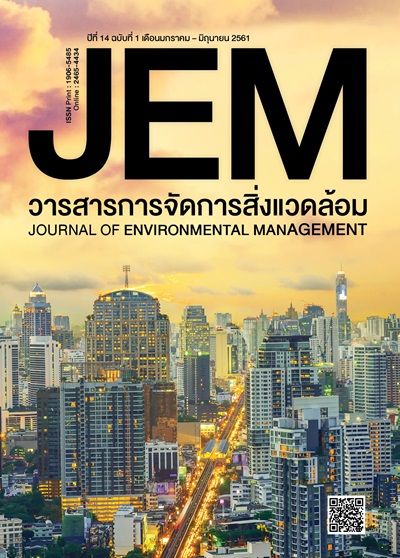ความร่วมมือในการจัดการชุมชนระหว่างองค์กรปกครองส่วนท้องถิ่นกับ ธ.ก.ส. เพื่อช่วยลดปัญหาโลกร้อนในท้องถิ่น Collaboration of Community Management between Local Administrative Organizations and BAAC to Reduce Global Warming in Local Area
คำสำคัญ:
ความร่วมมือในการจัดการชุมชน, องค์กรปกครองส่วนท้องถิ่น, ธ.ก.ส., ปัญหาโลกร้อนบทคัดย่อ
ปัญหาโลกร้อนมีสาเหตุมาจากก๊าซเรือนกระจก เช่น คาร์บอนไดออกไซด์ มีเทน และไนตรัสออกไซด์ ที่สะสมเพิ่มขึ้นจนทำให้ความร้อนถูกกักเก็บไว้ในโลกไม่สะท้อนกลับสู่ชั้นบรรยากาศ ปัจจุบันมนุษย์ยังไม่มีวิธีการในการลดโลกร้อน การลดปัญหาโลกร้อนที่ดำเนินอยู่ในปัจจุบัน เกิดจากต้นไม้ในป่าที่ช่วยกำจัดก๊าซคาร์บอนไดออกไซด์ด้วยการสังเคราะห์แสง และช่วยย่อยสลายก๊าซมีเทนและไนตรัสออกไซด์ ดังนั้นหากจะช่วยกันลดปัญหาโลกร้อน วิธีการที่ดีที่สุดคือช่วยกันปลูกและดูแลรักษาป่าไม้ให้ได้มากที่สุด ซึ่งบทบาทในการดูแลรักษาป่าไม้ของประเทศไทย นอกจากกรมป่าไม้และกรมอุทยานแห่งชาติแล้ว องค์กรปกครองส่วนท้องถิ่นที่ดูแลรับผิดชอบทุกพื้นที่ทุกชุมชนในประเทศไทยมีอำนาจหน้าที่ตามกฎหมายในการ “คุ้มครอง ดูแล และบำรุงรักษาป่าไม้ ที่ดิน ทรัพยากรธรรมชาติและสิ่งแวดล้อม” จึงไม่อาจเพิกเฉยหรือปฏิเสธความรับผิดชอบในการดูแลรักษาป่าไม้หรือเพิ่มพื้นที่การปลูกไม้ยืนต้นให้มากขึ้น ดังนั้นการจัดทำความร่วมมือกับธนาคารเพื่อการเกษตรและสหกรณ์การเกษตร (ธ.ก.ส.) ซึ่งมีโครงการธนาคารต้นไม้อยู่ในมือ เพื่อจัดตั้ง “กลุ่มธนาคารต้นไม้” ขึ้นในทุกชุมชนทั่วประเทศ จึงเป็นแนวทางเพิ่มปริมาณไม้ยืนต้นได้อย่างเป็นรูปธรรม และเป็นนวัตกรรมที่สะท้อนถึงความร่วมมือในการจัดการชุมชนเพื่อช่วยลดปัญหาโลกร้อนในระดับท้องถิ่นของประเทศไทย
เอกสารอ้างอิง
wealth, and sustainability [In Thai]. Bangkok: Bank for Agriculture and AgriculturalCooperatives.
Climate Watch Thailand. (2016). Paris Agreement COP 21 deals fairly lost responsibility [In Thai].
Retrieved May 4, 2017, from https://www.komchadluek.net/news/edu-health/220184
Department of Local Administration. (2015). Data of Local Government [In Thai]. Retrieved May 12,
2016, from https://www.dla.go.th/work/abt/
Environmental News Team. (2008). Global warming… Disaster stricken mankind, the year of mice
[In Thai]. Retrieved May 13, 2016, from https://campus.sanook.com/910338/
Erwin, W. (1976). Participation Management: Concept Theory and Implementation. Atlanta Ga:
Georgia State University.
Greenpeace Thailand.(2008). Global warming: impact on Thailand [In Thai]. Retrieved October
3, 2016, from https://www.greenpeace.org/seasia/th/solargen/climate-change/impacts/
impacts-thailand/
Intisang, J. (2008). Global warming and agricultural economy [1] [In Thai]. Retrieved September
29, 2016, from https://www.oae.go.th/ewtadmin/ewt/oae_baer/ewt_news.php?nid=380&
filename=index
Nimpitiwan, N., Sumpunna, R., & Kowit, N. (2010). Global warming and the country’s energy
situation [In Thai]. Executive Journal, 30(2), 105-109.
Pondy, L.R. (1969). Effects of Size, Complexity and Ownership on Administrative Intensity.
Administrative Science Quarterly, 14(1), 47-60.
Puapongsakorn, N., Thammapanitwong, K., & Anuchitworrawong, A. (2015). Global warming and
the impact on Thai agriculture [In Thai]. Retrieved October 3, 2016, from https://tdri.or.th/
tdri-insight/20150226/
Seub Nakhasathien Foundation. (2016). 80 ways to stop global warming [In Thai].Retrieved May 13, 2016,
from https://www.seub.or.th/index.php?option=com_content&view=article&id=184:80-
&catid=49:2009-11-03-07-41-25&Itemid=72
Thai News Agency. (2015). The government aims to restore the forest 600,000 rai [In Thai].
Retrieved February 14, 2017, from https://www.tnamcot.com/content/201735
Thailand Greenhouse Gas Management Organization (Public Organization). (2016). The impact
on Thailand [In Thai]. Retrieved October 3, 2016, from https://www.tgo.or.th/2015/thai/
content.php?s1=8&s2=27
World News. (2016). COP 21 Get a deal to reduce global warming [In Thai]. Retrieved May 4, 2017,
from https://www.posttoday.com/world/news/404663



